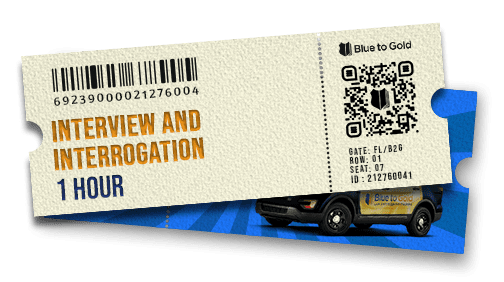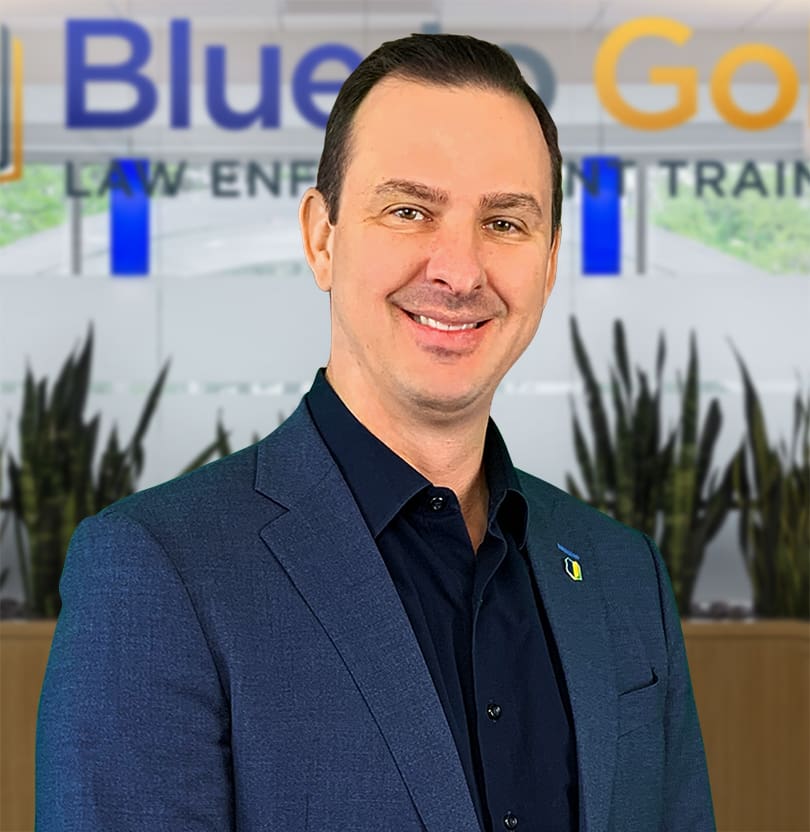Module One: Course Introduction
1. Instructor
2. Explain the course
3. Encourage attendees to ask questions and share feedback with other
4. Explain that certificates will be emailed after the
5. Go over the three disclaimers:
- Laws and agency standard operating procedures may be more restrictive. Blue to Gold is teaching the federal standard unless otherwise stated. Therefore, students must know their state and local requirements in addition to the federal
- If students have any doubts about their actions, ask a supervisor or legal
- The course is not legal advice, but legal education. Therefore, nothing we teach should be interpreted as legal advice. Check with your agency’s legal advisor for legal
Module Two: Miranda Requirements
1. Legal Rule: The 5th Amendment is always available but is not self-executing until the person is in custody.
2. Legal Rule: Whether a suspect is “in-custody” depends on whether “He has been formally arrested, or there exists a restraint on freedom of movement of the degree associated with a formal ”
3. Pro Tip: Not being “free to leave” does not automatically mean Miranda is
4. Pro Tip: Try removing the “custody” from a “detention” by:
- Telling suspect he is not under arrest (if true)
- Remove handcuffs if safe
- Be inquisitive not accusatory (witness v suspect)
- Other efforts to reduce coercive atmosphere
5. Video: “Telling Suspect: Not Under Arrest”
6. Factors to help determine whether someone is under arrest-like custody.
7. Pro Tip: If the subject appears cooperative, and ready to waive, try to get a If not, and he’s not under arrest, reduce or eliminate any “coercive” factors or hold-off interview
8. Legal Rule: Miranda applies when the suspect knew he was talking to an officer/agent or a lawyer has been assigned
9. Case Sample: Murder suspect invoked his right to His girlfriend showed up at station and cop asked her to get a confession, which was recorded. Held: Valid tactic since suspect did not know girlfriend was agent of police. People v Orozco
10. US Supreme Court: We reject the argument that Miranda warnings are required whenever a suspect is in custody … and converses with someone who happens to be a government
11. Conversations between suspects and undercover agents do not implicate the concerns underlying The essential ingredients of a “police-dominated atmosphere” and compulsion are not present when an incarcerated person speaks freely to someone whom he believes to be a fellow inmate. Coercion is determined from the perspective of the suspect.
12. US Supreme Court: Miranda forbids coercion, not mere strategic deception by taking advantage of a suspect’s misplaced trust…
13. Legal Rule: Remember, if the 6th Amendment right to counsel applies, charged crimes or uncharged crimes intertwined with the charged crime, are off-limits
14. What would you do? Are exact phrases required?
15. If officers begin to vary from the standard language, their burden of establishing that defendants have been adequately advised before waiving their rights will increase substantially. People v Prysock
16. Video: “The Other Guys Miranda”
17. Case Sample: You arrest a judge for domestic You begin to read him Miranda and he cuts you off and says, “I know my Miranda rights! I waive them and want to share my side of the story.” Valid waiver? Martin v Marinez Held: No, because “substantial compliance” is required.
18. Six Miranda Issues
Module Three: Coercive Factors
1. Legal Rule: A coerced statement cannot be used for any purpose and is actionable under 1983.
2. Why is Coercion Prohibited?
Module Four: Waivers
1. Legal Rule: A Miranda waiver must be knowing, intelligent, and voluntary.
2. What would you do? What about talking to the suspect about general things before you seek your waiver?
3. Pro Tip: Quick pre-Miranda conversations are permitted:
- To build rapport
- Establish that suspect has capacity to waive
- Obviously cannot talk about anything likely to casue incriminating statements
4. Legal Rule: “Knowing” and “intelligent” means that the suspect was fully aware of his Miranda rights and the consequence of
5. Knowing Factors
6. Legal Rule: “Voluntary” means that the suspect waived his rights by free choice, not because of police coercion.
7. Voluntary Factors
8. Two Types of Waivers
9. Legal Rule: Express waivers are easy—the suspect affirmatively waivers his
10. Legal Rule: Implied waivers require articulation and are presumed invalid.
11. How to Articulate Implied Waiver
12. Video: “Implied Waiver”
13. Questions
14. Pro Tip: If the suspect will be interrogated by detectives, let them get the waiver. The arresting officer should be respectful and polite! Don’t needlessly piss off the suspect so he shuts-down on detectives.
Module Five Invocations:
1. Legal Rule: If a suspect properly invokes, it must be Your later options depend on what right was invoked.
2. Case Sample: After a suspect unambiguously invoked his right to remain silent the officer asked the suspect “Why?” and further dialog caused the suspect to change his Held: The officer did not scrupulously honor the suspect’s invocation and violated Miranda
3. Legal Rule: Invocations must be unambiguous and unequivocal (leaves no doubt).
4. Pro Tip: Courts separate ambiguous statement into two groups: Statements made during waiver process and statements made during the
5. Pro Tip: You have an obligation to clarify ambiguous invocations during the waiver process, but not during the Make sense?
6. Legal Rule: Invocations are not crime He may not be interrogated about any crime by any officer unless a reinitiating rule applies.
7. Video: “Valid Invocation?”
8. Pro Tip: Determine who will get the waiver, and let that officer handle it. Having two or more officers work on the waiver may psychologically overwhelm the suspect causing needless invocations.
Module Six: Reinitiating
1. Legal Rule: If suspect invokes his right to counsel, only two ways to reinitiate interrogation.
2. Two ways to Reinitiate
3. Case Sample: An in-custody suspect invoked his right to The suspect spoke with counsel. Later, a different agency interrogated the suspect about a different crime and got a waiver. Proper? Synopsis: In Minnick v. Mississippi, the court held that the Edwards rule applied even when the second interview was conducted by a different law enforcement agency than the agency conducting the first interview and even if the suspect had a chance to consult with an attorney in the time between the first and second interview. Held: No, his attorney was not present nor had 14 day elapsed.
4. Case Sample: A suspect invoked his right to He was convicted and sentenced. Police then spoke to him about an uncharged crime. Proper? Synopsis: Arguments heard, 52 Crim. Rev. (BNA) 3096-97 (Nov. 30, 1992); where the lower appellate court found that interviewing an in-custody juvenile about a separate, uncharged offense, five months after he invoked his right to an attorney on the prior, charged case, but before being sentenced, was a violation of the Edwards rule. (The appeal was never resolved by the Supreme Court because the
Held: Yes, 14 days had elapsed and prison sentence is not considered “Miranda custody.”
5. Pro Tip: The rule regarding reinitiating is the same for counsel and silence and will be discussed later.
6. Legal Rule: If suspect invokes his right to silence, only two ways to reinitiate interrogation
7. Case Sample: Suspect invoked right to remain Two hours later suspect was questioned by different officers at different location. He waived Miranda. Michigan v. Mosley
Held: The invocation was scrupulously honored. Valid waiver
Tip: If you want to reinitiate for same case, wait a sleep cycle.
8. Legal Rule: A suspect always has the option to reinitiate a general dialog about the crime, even if he invoked – he can change his mind at any time!
9. However, any re-initiation of questioning, at least when he had invoked his right to the assistance of counsel, must be on the subject’s own initiative. Any reopening of the dialogue about the facts of the case, resulting in the suspect changing his mind, will not likely result in admissible statements.
10. Pro Tip: If a suspect invokes, I recommend you leave a business card and say, “If you change your mind give me a call.” Then leave.
11. Pro Tip: If the suspect reinitiates, provide a fresh warning and obtain a written
12. A complete re-admonishment would seem to be the minimum an officer should do when a subject attempts to reinitiate However, failing to re-admonish a suspect who is attempting to reinitiate the interrogation is but one factor to consider, and is not necessarily fatal “if the □totality of the circumstances shows the suspect’s waiver remains voluntary, knowing and intelligent.
13. Case Sample: Suspect invoked. Later, suspect said that he didn’t like the interrogating officer but would talk to the booking Synopsis: Because defendant didn’t like his initial interrogator but appreciated the courtesy of the officer who did his booking interview, defendant volunteered to make a statement to this second officer after initially having invoked his right to counsel. People v. Enraca Held: The suspect reinitiated the interrogation.
14. Case Sample: Suspect Later, he told the officer, “If this is about the missing serial number (on a gun he had), I didn’t know it was missing.” People v. Enraca Held: The suspect reinitiated the interrogation.
Module Seven: Exceptions
1. Legal Rule: The Public Safety Doctrine is an exception for legitimate safety concerns
2. Pro Tip: Stay away from “why”
3. What would you do? Suspect ran from police through grocery store. He was caught and during search police found empty holster. Officer asked, where did you ditch the gun? Suspect told officer where he hid it. Proper? Answer: Yes, statements are admissible.
4. Video: “Valid Public Safety Exception?”
Module Seven: Violations
1. Legal Rule: Intentional violations may not be “cleansed” with a proper
2. Sample Case: Officers, based on training, interrogated the suspect without Miranda in order to make subsequent Miranda waiver easier – referred to as the “cat out of the bag theory.” Proper? Held: No. All statements will be suppressed.
3. Legal Rule: Unintentional violations may be be “cleansed” with a proper
4. What would you do? Arrested suspect was not While searching his car you find meth in center console. Excited, you hold up baggie and ask suspect, “Is this yours?” He nods yes. Miranda violation? Answer: Yes, but if accidental may be cleansed.
5. Things that help cleanse accidental miranda violations
6. Pro Tip: What are the three factors needed for Miranda to apply?
Module Eight: Takeaways
End of class.












